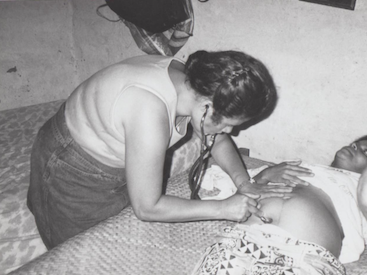
Parteras / Midwives
Asociación de Parteras Rosa Andrade
For the past three decades, the Association of Parteras Rosa Andrade, a group of 30 midwives, has been fighting for the reproductive rights of thousands of people living in 35 rural communities in the municipality of Suchitoto, Cuscatlán, El Salvador. Most of the midwives either began or continued the work of attending births during the 12-year-long Civil War, when pregnant people in rural areas and guerrilla and refugee camps could not seek medical attention due to the extreme terror inflicted by the U.S.-backed military dictatorship. Many of the midwives learned ancestral midwifery practices from their mothers and older midwives in their communities.
La Asociación de Parteras Rosa Andrade es un grupo de 30 parteras que llevan tres décadas luchando por los derechos reproductivos de miles de personas que viven en 35 comunidades rurales del municipio de Suchitoto, Cuscatlán, El Salvador. La mayoría las parteras comenzaron o continuaron el trabajo de atender partos durante la guerra civil de 12 años, cuando las personas embarazadas en áreas rurales y en los campamentos guerrilleros y de refugiados no podían buscar atención médica debido al terror extremo infligido por la dictadura militar respaldada por los Estados Unidos. Muchas de las parteras aprendieron prácticas ancestrales de partería de sus madres y parteras mayores en sus comunidades.
Giving life to post-war communities
When ex-guerrilla fighters and refugees began to repopulate the municipality of Suchitoto, Cuscatlán at the end of the war, building communities with the scarce resources available to them, the midwives continued attending births. At this time, the only hospital in the municipality was completely inaccessible to people living in rural communities; midwives were the only help available during births and in other medical emergencies. Between 1993 and 1994, the two years following the end of the Civil War, 45 midwives became organized and received “formal” training from a program set up by two nurse-midwives working with the International Medical Relief Fund. Most of these midwives have remained organized as an association ever since.
Cuando ex guerrilleros y refugiados comenzaron a repoblar el municipio de Suchitoto, Cuscatlán al final de la guerra, construyendo comunidades con los escasos recursos de que disponían, las parteras continuaron atendiendo partos. En ese momento, el único hospital del municipio era completamente inaccesible para las personas que vivían en comunidades rurales; las parteras eran la única ayuda disponible durante los partos y otras emergencias médicas. Entre 1993 y 1994, los dos años posteriores al final de la guerra civil, 45 parteras se organizaron y recibieron capacitación “formal” de un programa establecido por dos enfermeras parteras que trabajaban con el Fondo Internacional de Socorro Médico. La mayoría de estas parteras han permanecido organizadas como asociación durante desde ese entonces.
Criminalization of home births
The Salvadoran government does not recognize the work of midwives, and in the past decade has made a strong effort to prohibit midwives from practicing nation-wide. In 2011 the Association received a threatening letter from the Ministry of Health warning that home births are banned, and that if anything were to go wrong during a birth the midwife present would go to jail. Despite extreme repression, the Association continues to provide prenatal care, contraceptives, sexual health education, and domestic violence counseling to people in rural communities. Even though they run the risk of being persecuted, the midwives also attend births in the case of emergencies, especially during COVID-19 because the hospitals are overrun.
El gobierno salvadoreño no reconoce el trabajo de las parteras y en la última década ha hecho un gran esfuerzo para prohibir que las parteras ejerzan en todo el país. En 2011, la asociación recibió una carta amenazante del Ministerio de Salud advirtiendo que los partos comunitarios están prohibidos y que si algo saliera mal durante un parto, la partera presente podría ir a la cárcel. A pesar de la represión extrema, la asociación continúa brindando atención prenatal, anticonceptivos, educación sobre salud sexual y asesoramiento sobre violencia doméstica a personas en comunidades rurales. A pesar del riesgo que corren de ser perseguidas, las parteras también atienden partos en casos de emergencia, especialmente durante el COVID-19 porque los hospitales están llenos.

Las parteras siguen luchando
Midwives continue the struggle
“A través de la solidaridad y el amor hacia las mujeres, hemos logrado mantener nuestra asociación y nuestro trabajo como parteras viva.”
“Through solidarity and the love we have for women, we have managed to keep our association and our work as midwives alive.”
-Asociación de Parteras Rosa Andrade













